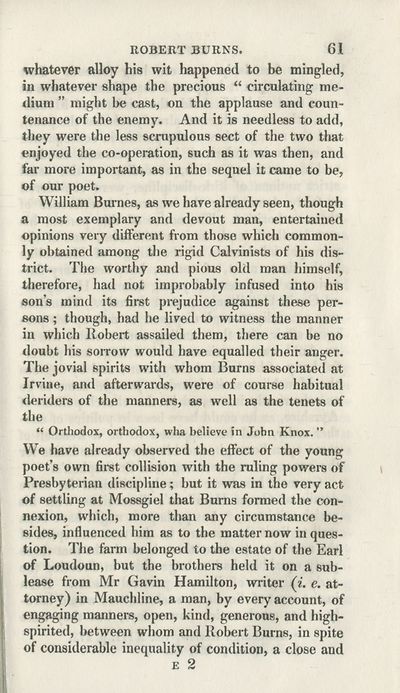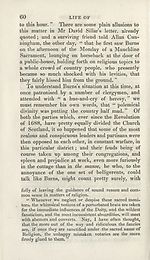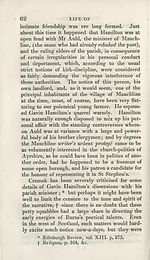Download files
Complete book:
Individual page:
Thumbnail gallery: Grid view | List view

KOBEUT BURNS. 61
whatever alloy his wit happened to be mingled,
in whatever shape the precious “ circulating me¬
dium ” might be cast, on the applause and coun¬
tenance of the enemy. And it is needless to add,
they were the less scrupulous sect of the two that
enjoyed the co-operation, such as it was then, and
far more important, as in the sequel it came to be,
of our poet.
William Bui nes, as we have already seen, though
a most exemplary and devout man, entertained
opinions very different from those which common¬
ly obtained among the rigid Calvinists of his dis¬
trict. The worthy and pious old man himself,
therefore, had not improbably infused into his
son’s mind its first prejudice against these per¬
sons ; though, had he lived to witness the manner
in which Robert assailed them, there can be no
doubt his sorrow would have equalled their anger.
The jovial spirits with whom Burns associated at
Irvine, and afterwards, were of course habitual
deciders of the manners, as well as the tenets of
the
“ Orthodox, orthodox, wha believe in John Knox. ”
We have already observed the effect of the young
poet’s own first collision with the ruling powers of
Presbyterian discipline; but it was in the very act
of settling at Mossgiel that Burns formed the con¬
nexion, which, more than any circumstance be¬
sides, influenced him as to the matter now in ques¬
tion. The farm belonged to the estate of the Earl
of Loudoun, but the brothers held it on a sub¬
lease from Mr Gavin Hamilton, writer (i. e. at¬
torney) in Mauchline, a man, by every account, of
engaging manners, open, kind, generous, and high-
spirited, between whom and Robert Burns, in spite
of considerable inequality of condition, a close and
E 2
whatever alloy his wit happened to be mingled,
in whatever shape the precious “ circulating me¬
dium ” might be cast, on the applause and coun¬
tenance of the enemy. And it is needless to add,
they were the less scrupulous sect of the two that
enjoyed the co-operation, such as it was then, and
far more important, as in the sequel it came to be,
of our poet.
William Bui nes, as we have already seen, though
a most exemplary and devout man, entertained
opinions very different from those which common¬
ly obtained among the rigid Calvinists of his dis¬
trict. The worthy and pious old man himself,
therefore, had not improbably infused into his
son’s mind its first prejudice against these per¬
sons ; though, had he lived to witness the manner
in which Robert assailed them, there can be no
doubt his sorrow would have equalled their anger.
The jovial spirits with whom Burns associated at
Irvine, and afterwards, were of course habitual
deciders of the manners, as well as the tenets of
the
“ Orthodox, orthodox, wha believe in John Knox. ”
We have already observed the effect of the young
poet’s own first collision with the ruling powers of
Presbyterian discipline; but it was in the very act
of settling at Mossgiel that Burns formed the con¬
nexion, which, more than any circumstance be¬
sides, influenced him as to the matter now in ques¬
tion. The farm belonged to the estate of the Earl
of Loudoun, but the brothers held it on a sub¬
lease from Mr Gavin Hamilton, writer (i. e. at¬
torney) in Mauchline, a man, by every account, of
engaging manners, open, kind, generous, and high-
spirited, between whom and Robert Burns, in spite
of considerable inequality of condition, a close and
E 2
Set display mode to:
![]() Universal Viewer |
Universal Viewer | ![]() Mirador |
Large image | Transcription
Mirador |
Large image | Transcription
| Antiquarian books of Scotland > Scotland/Scots > Life of Robert Burns > (71) |
|---|
| Permanent URL | https://digital.nls.uk/108246711 |
|---|
| Description | Thousands of printed books from the Antiquarian Books of Scotland collection which dates from 1641 to the 1980s. The collection consists of 14,800 books which were published in Scotland or have a Scottish connection, e.g. through the author, printer or owner. Subjects covered include sport, education, diseases, adventure, occupations, Jacobites, politics and religion. Among the 29 languages represented are English, Gaelic, Italian, French, Russian and Swedish. |
|---|

